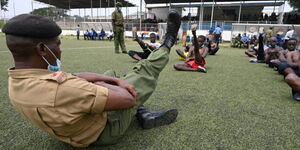On Monday, February 12, morning, Kenyans and the world's athletics community woke up to harrowing news of the death of marathoner Kelvin Kiptum following a road accident along the road connecting Eldoret and Kaptagat towns.
A police report obtained by Kenyans.co.ke indicated that the vehicle Kiptum was driving landed into a ditch claiming both his life and that of his coach, Rwandan national Gervais Hakizimana, on the spot. A lady who was in the car with them survived after sustaining serious injuries and was rushed to hospital for treatment.
"Upon reaching the location of the accident, he lost control and veered off-road entering into a ditch on his left side. He drove in the ditch for about 60 meters before hitting a big tree," read the police report in part.
"As a result, Kelvin Kiptum and Gervais Hakizimana died on the spot whereas Sharon Chepkurui Kosgei escaped with serious injuries and was rushed to Moi Teaching and Referral Hospital for treatment."
Kenyans.co.ke traced Kiptum's career in the last two weeks peeking into the intense process he was subjected to before his world record in Chicago last year was ratified as well as his training towards the upcoming Rotterdam Marathon scheduled for April this year.
In October last year, Kiptum became the first human to run below 2 hours and 1 minute during the Chicago Marathon where he clocked 2:00:35. His record surpassed that of marathoner Eliud Kipchoge.
Last week, the World Athletics officially ratified his record, cementing him as the fastest marathoner on the planet.
The global governing body for athletics subjected the marathoner to numerous processes including testing several samples for doping before his record was ratified.
These tests are often carried out to ascertain that the athlete did not use banned substances to help them win the race.
The ratification process includes doping control and shoe compliance.
According to the World Athletics, all marathons and half marathons must be achieved on a course that holds a valid International Course Measurement Certificate established no more than five years before the date of the race.
Kiptum's record was finally ratified last week, four months after he broke the record, obliterating 34 seconds off an earlier record by Kipchoge.
Rotterdam Marathon in April
In recent weeks, the marathoner was also engaged in intense exercise ahead of the upcoming Rotterdam Marathon in which he was expected to face off with Eliud Kipchoge.
His coach Hakizimana, in an earlier interview, revealed that Kiptum engages in an intense training regimen in which he accomplishes between 250 kilometres and 300 kilometres.
“During the preparation for London, we spent three weeks at more than 300km. That’s a very large volume. He works a lot on endurance. When he’s training, he’s strong," the coach revealed in a past interview.
Broken down, Kiptum covers 40km on Mondays, Wednesdays, and Fridays in morning and afternoon sessions. On Tuesday, he exercises on the track with Fartlek sessions.
On Thursdays and Sundays, he also completes 40 kilometres at marathon pace while on Saturdays, he may opt for track events or road work.
Hakizamana previously admitted to how intense the exercise process can be and noted that he was worried for the athlete but insisted that Kiptum only rested when he was tired.
“He’s very strong. He does all the training properly. He’s in his best years but at some point, I’m afraid he’ll get injured,” he stated in an Interview with AFP.
The Chicago race was the third of his career.












